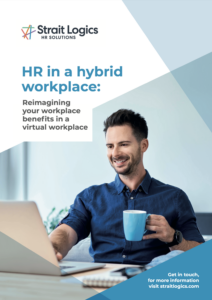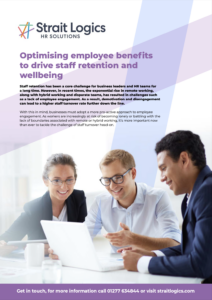
As inflation reaches a 30 year high, and household bills and fuel prices continue to skyrocket, UK households are having to tighten their belts in the face of an economic downturn.
While unemployment rates have fallen close to a record low, the cost of living crisis is set to impact those on a lower salary, with typical working-age household incomes set to fall by 4% according to the Resolution Foundation.
With the economic impacts of the global pandemic and the war in Ukraine set to linger well into next year, businesses, as well as employees, are set to feel the pinch as well, meaning increasing salaries might not always be an option.
But at a time when 36% of millennials felt that money worries have impacted their workplace performance, it’s in business leaders’ interest to ensure they’re doing their bit to alleviate financial stress where they can. So how can business leaders help their staff stay afloat, and manage their financial health despite surging living costs?
In this post, we’ll explore a few ways in which HR teams or business owners could support their staff and promote better financial wellbeing among their workers.
Promoting better pension choices
In the midst of a financial crisis, it’s easy to focus on the here and now. Simply ensuring the next few weeks are manageable might seem enough of a challenge, let alone planning for future retirement. But it’s important that your employees feel that they’re in control of their financial future, as well as their current money situation.
As some might be tempted to cut their pension contributions or bow out of the scheme altogether, for the sake of more immediate money in the bank, businesses ought to do what they can to educate staff on the longer-term financial risks of neglecting their pension plans right now.
For those looking to provide better advice and information to help employees plan for a healthier approach to their money in the future, business leaders can point staff in the direction of free and impartial guidance such as that offered by the Money and Pensions Service.
Encouraging better choices around pension plans is a good place to start for employees looking to build a better financial future.
Nurturing a culture of fairness and honesty
When it comes to talking about their finances, Britons are somewhat notorious for being a little guarded. But being able to open up about financial stress is extremely important. And whether you’re an employee or an employer, this works both ways.
Building a culture of openness and honesty around financial matters is crucial as we navigate the economic uncertainty of the coming months. Essentially, employees will want to know that their employer is on their side. That means, firstly, looking at how fair your payment processes are as an organisation. For example:
- Is there good communication around payroll dates?
Leaving employees in the dark about what day of the month they may expect payment or running payroll late can cause real uncertainty and stress for your staff.
- Have you examined your salaries?
Taking the time to check your salary offerings are up to date, and in line with real living wages and the cost of living is key. Staff that feel they’re being renumerated will feel more satisfied, engaged and less stressed, and are likely to stick around for longer.
- How wide are your pay gaps?
You’ll want to ensure that payment outcomes and processes can’t be construed as unfair in cases of any pay gaps by gender or ethnicity – examining the reasons behind any such salary discrepancies is essential if you want to protect your reputation as a fair and inclusive employer.
In laying the foundations for fair payment, and opening the conversation, you’ll lead by example and encourage better communication and a healthier attitude towards money worries in return. For example, one-to-one meetings with managers or specific money coach experts could allow staff to raise concerns around equal pay, cost of living or salary reviews and give staff the outlet they need to voice any concerns. Providing a safe, open environment where your workforce feels safe to be vulnerable, means you can take action to prevent employee money stress before it impacts productivity.
Build a better benefits programme and awareness of staff rewards
It’s easy for employees to get absorbed by the everyday tasks and stressors of the day job. What with the added financial stress of simple everyday living, it could be hard for workers to see the light at the end of the tunnel. Financial stress could have a huge impact on the general wellbeing of your workforce.
A recent PwC survey indicated that 72% would consider switching jobs if another company cared more about their financial wellbeing. In addition to this, 45% of employees claimed their finances have been a distraction at work.
That means it’s more important now than ever to find ways to support your employees through the turbulent economic crisis, communicate this regularly and effectively, or risk losing your key talent.
In addition to providing fair salaries in line with the cost of living, some of the ways you could support your team members could include benefits such as the following:
- Comprehensive pension plans
- Employee shares schemes
- Access to a discount shopping portal
- Discounted gym membership
- Financial guidance
- Counselling / Employee Assistance Programme
- Cycle to work schemes
- Private medical insurance
- Hybrid working, remote working or contributions towards the daily commute
Whatever benefits you choose to offer, make sure they work for your workforce. You’ll also want to ensure that your staff are fully aware of all of the benefits available to them, and how these rewards might help, little by little, to allow them to build a better sense of financial wellbeing.
With customised benefits, workers can make smarter savings and invest in their future, helping them to feel their needs are being heard and acknowledged with better long-term financial stability in the workplace.
Strait Logics HR solutions allow you to customise your benefits portfolio according to the goals of your business and the needs of your staff. For example, with our Rewards Portal solution in place, you facilitate a virtual space where your valued employees can see a full indication of their workplace value at a glance from wherever they are. From here, they can build a personalised selection of benefits that are tailored for them and their needs.

